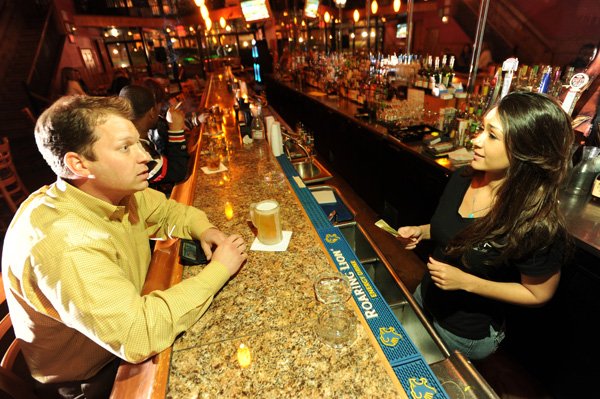FAYETTEVILLE — Cole Keene is well aware of the adverse effects of smoking cigarettes.
Keene said she doesn’t smoke anymore herself, but, as a bartender at Stir on Dickson Street, the acrid haze of a smoke-filled barroom is often dift cult to avoid.
According to the Northwest Arkansas Tobacco Free Coalition, a bartender like Keene inhales the equivalent of one to two packs of cigarettes during a typical eighthour shift. The group, which last week held its first public meeting to discuss extending a city smoking ban to bars, said Keene is just the kind of person who needs to be protected with a further-reaching ordinance.
Americans for Nonsmokers’ Rights, a national anti-smoking lobbying organization, reports that bartenders have rates of lung cancer higher than firefighters, duct workers, dry cleaners and even coal miners.
Part of the argument behind expanding Fayetteville’s smoking ordinance, which already prohibits indoor smoking at restaurants and other workplaces, is that bartenders, cocktail servers and performers — as well as nonsmoking customers — should be able to avoid the negative effects of cigarette smoke in establishments that serve alcohol only.
“I don’t want folks who need a job to have to be exposed to something that’s as harmful as secondhand smoke,” Ward 1 Alderwoman Adella Gray said.
Last week, Gray filed a proposed amendment to Fayetteville’s existing smoking ordinance, which went into effect in 2004 after heated debate. Gray said two other aldermen have offered to co-sponsor the legislation, which would remove the exemption for bars. The measure is expected to appear before the City Council later this year.
But as the push begins to extend the reach of the ordinance, Keene said she doesn’t necessarily want or need to be protected.
“There’s no one who needs to watch out for me,” Keene said.
“I’m not 18.”
“Most bartenders that are in this atmosphere are people that want to smoke and drink.”
For some, like University of Arkansas junior Hillary Scott, whether or not a bar allows smoking has an impact on where she
decides to go out for the night.
“I don’t like waking up and having my hair and clothes reek of smoke,” Scott said. “It makes me want to vomit.”
Scott’s classmate, Maddie Schaffer, said it seems like a long time ago when restaurants actually did allow smoking.
In five, 10 or 15 years, people will look back on smoking in bars as a thing of the past, too, Schaff er said.
“People adjust. It’s just like people adjusting to restaurant nonsmoking. People will adjust to bar nonsmoking.”
Danny Klein, who ducked outside of Crown Pub on Thursday night to have a cigarette, said his decision on where to go isn’t really influenced by whether a place allows smoking.
Crown Pub is one of a handful of standalone bars in Fayetteville that is voluntarily smoke-free.
Klein said he doesn’t have a problem with the existing ordinance that bans smoking in restaurants, and as a server at Hammontree’s on West Avenue, he said it’s nice not having smoke around him all the time at work.
“But bars are a different story,” Klein added. “I’m used to going to a bar, having a beer and smoking. The two just go together.” Like Crown Pub, Tables & Ale on Block Avenue also experimented with a voluntary smoking ban.
Bartender Katy Troillett said after about a week and a half with no smoking last summer, sales dropped so significantly that owner Bobby Craft decided to reinstate smoking.
“Especially in a pool hall, you want to shoot pool and have a cigarette,” Troillett said.
Even as a nonsmoker, she said she knew full well what she was getting into by choosing to work in a bar.
“I volunteered to try to get this job, and I knew what it entailed,” Troillett said.
“I make really good money, and if I didn’t want to work here, then I wouldn’t.
“I’d rather have that then have the business failing.”
Joe McDermott, a manager at J R’s on Block Avenue, said he believes an expanded smoking ordinance would adversely impact business at his bar.
“I know it’s a good thing for secondhand smoke,” McDermott said, “but we do get business from people who do want to smoke indoors.”
A smoker himself, he said the “vast majority” of people who come to J R’s are smokers also. “I know there has to be people that don’t come here because it’s smoking, but I don’t see them because I’m here all the time.”
Also on Block Avenue at Maxine’s Tap Room, Chris Rasco poured drinks Thursday night in a room free from cigarette smoke.
For years, the bar, which opened in 1950, was owned by Marjorie Maxine Miller, a Fayetteville icon, who was easily recognized by many patrons by her perch on a bar stool in the middle of the bar, cigarette often in hand.
Miller died in May 2006.
Rasco, who is engaged to Miller’s great-niece — and the bar’s current owner — Andrea Foren, said when they were debating going smoke-free last year, “A lot of people said, ‘If Maxine knew about it, she’d roll over in her grave.’”
But after polling some of the bar’s regulars, the decision was made.
Rasco said customer feedback at the time was split about 50-50.
“A lot of smokers didn’t care,” he said. “Some did. And, of course, a lot of nonsmokers were in favor.”
“A few (customers) threatened they’d never come in here again,” Rasco added.
“But, literally, a week later, you’d see them out front having a cigarette, and they’d come in and have a beer.”

